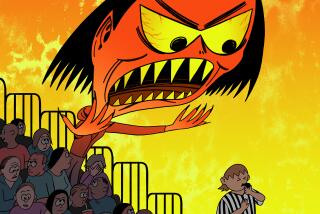The M.D.: When anger reaches the danger zone
- Share via
There’s nothing like a children’s sporting event to rile people up. Confined to the sidelines, parents and coaches routinely scream at one another, at the referees and sometimes even at the kids. This last spring, I experienced firsthand just how bad behavior on the field could get.
My 9-year-old son’s flag football team advanced to the quarterfinals of the park league he was playing in, and it quickly became apparent that the opposing team’s coach was set on winning at all costs. He paced, yelled and, just for good measure, occasionally threw things. His final act of aggression, however, was directed at me and a group of other mothers from my son’s team. Catching sight of our disparaging looks, he challenged us to a verbal head-to-head.
The experience got me wondering. Can anger be an illness? In many cases, out-of-control, intensely felt emotions are recognized as full-blown disorders. People who are extremely sad have depression; those who worry excessively suffer from anxiety.
But people with anger problems aren’t categorized this way. Anger is largely viewed as a secondary emotion — one caused by other psychiatric conditions. People are thought to be angry because they’re sad, anxious or stressed. The idea that anger can be a problem all on its own is one that many psychiatrists and psychologists have traditionally resisted.
Today, though, a growing number of mental health experts contend that anger merits its own diagnosis. They believe that anger is a legitimate clinical problem and that anger itself is a reasonable treatment target.
Differentiating “normal” anger from excessive anger is challenging, of course. After all, everyone gets really mad from time to time. But the two do differ in several fundamental ways.
Disordered anger, as it’s sometimes called, tends to be of greater intensity. It takes very little to set off individuals with an anger problem, and their responses are typically overblown. An example: While most people would get upset if a reckless driver cut them off, someone with disordered anger might try to retaliate by chasing down the car and forcing it off the road.
And in cases of disordered anger, episodes of rage tend to occur more frequently and last longer. For most people, angry feelings resolve relatively quickly. But people with anger problems often stew for days, weeks or even years; their feelings of rage fail to diminish over time.
Consequences are also important to consider: Disordered anger often wreaks havoc on people’s lives. “It interferes with people’s relationships and their jobs,” says Raymond Chip Tafrate, a clinical psychologist at Central Connecticut State University and coauthor of “Anger Management for Everyone: Seven Proven Ways to Control Anger and Live a Happier Life.” “Even their health is affected.”
Ongoing anger clearly increases the risk of certain health problems. “When a person is angry, their heart beats faster and their blood pressure goes up,” says Howard Kassinove, a professor in the department of psychology at Hofstra University in New York and co-author with Tafrate of the anger-management book. Over time, these changes take their toll on the body, he adds. “Numerous studies have found that individuals with high self-reported anger have significantly higher rates of heart disease and stroke.”
Identifying even those with the most extreme cases of disordered anger isn’t straightforward: It’s not a matter of just picking the people who scream the most or the loudest. “There’s not [only] one way to have an anger problem,” Tafrate says.
Some people have problems with anger expression: They’re the ones who are often verbally abusive or engage in physically aggressive behavior when upset. But others have anger that’s not confrontational. “There are really angry people who don’t explode,” Kassinove says. They seethe inwardly and ruminate quietly; they experience anger in their heads.
Unfortunately, it’s not always easy to get angry people to accept that they need help. They may rationalize their behavior by accusing others of provoking them: Problems at home are blamed on a spouse, difficulties at work on a boss; troubles on the road on other drivers. They won’t take responsibility for their emotional outbursts or smoldering fury.
When people do acknowledge the problem, there are treatments that can help. Anger-management programs teach people to temper their responses to stressful situations through the use of relaxation techniques and cognitive therapy. These programs sometimes include life-skills training as well: Increasing someone’s level of competence — whether on the job or as a parent or partner — helps bring down stress and diminish angry feelings.
My son’s team lost that quarterfinal game, and their undefeated season ended abruptly. But their loss was dignified — the boys played hard and fairly, and their coaches displayed impeccable sportsmanship and served as ideal role models.
Honestly, the loss wasn’t nearly as upsetting as the display of aggression by the other team’s coach. Although I really wanted to give him a piece of my mind that day on the field, I managed to keep my emotions in check and my mouth shut. I now feel lucky that I did.
Not only did I avoid an ugly scene in front of the boys, I stopped myself from saying things I would have come to regret as well. Had I spoken up, I imagine I would have told the coach that he needed to calm down — that he was embarrassing not only himself but also the boys on his team. While that may have made me feel a little better, it wouldn’t have helped him at all. It would have been like telling someone with depression to cheer up, or someone with anxiety to stop worrying. Calming down wasn’t a possibility for this man — his emotions so clearly had the upper hand.
Ulene is a board-certified specialist in preventive medicine practicing in Los Angeles. The M.D. appears once a month.
themd@att.net
More to Read
Go beyond the scoreboard
Get the latest on L.A.'s teams in the daily Sports Report newsletter.
You may occasionally receive promotional content from the Los Angeles Times.










